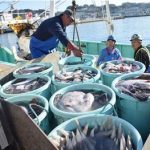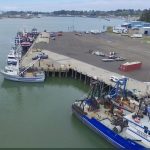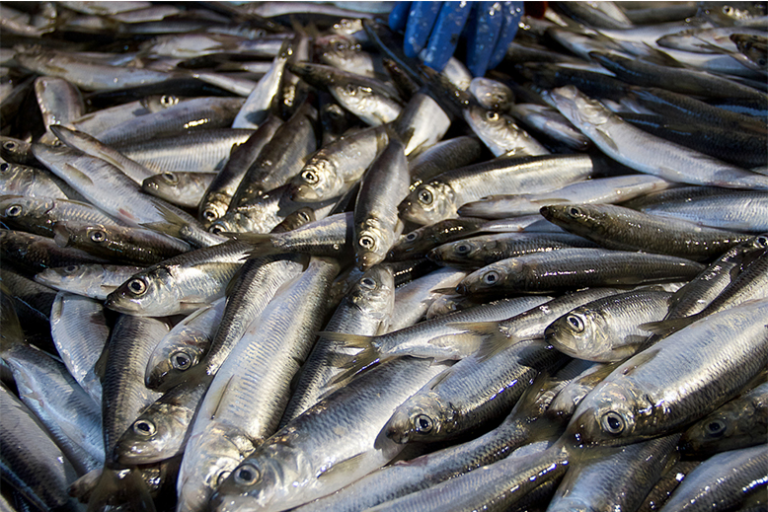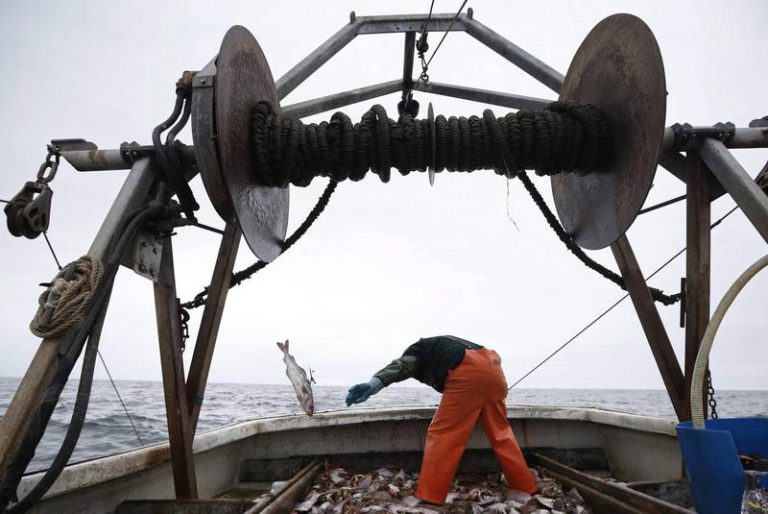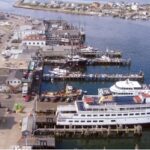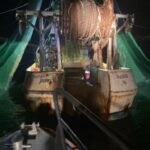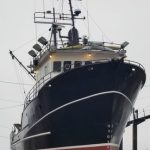Tag Archives: University of Maine
Bill to move Monhegan wind power project draws crowd to legislative hearing
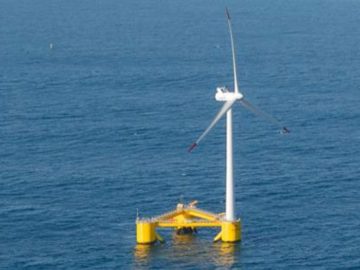 Lawmakers heard passionate, conflicting testimony Tuesday from dozens of people on a bill aimed at moving a nationally significant wind energy test site farther from Monhegan Island. Supporters said views of two massive floating turbines would jeopardize tourism, lobster fishing, migrating birds and the sense of serenity associated with Monhegan’s wild beauty. Some said island residents were being bullied and divided by the University of Maine and the partners of Maine Aqua Ventus, a project that is testing new technology for offshore wind turbines about 3 miles from the island. The project initially promised a small, brief test, but has now expanded it beyond anyone’s expectations. Opponents of the bill, which would move the test site at least 7 miles farther out to sea, said it is unneeded and unwelcome, adding that it would short-circuit the process by which islanders are evaluating the project’s potential benefits. Both sides said much is at stake. But representatives of the Maine Lobstering Union, which represents 500 fishermen, said wind power has no place on the Maine coast. Other lobstermen, though, spoke in favor of the turbines. Mary Weber, whose husband, Matt, fishes around the island, said they didn’t think the turbines would deter tourists, and might even draw a new set of visitors interested in clean energy. click here to read the story 15:30
Lawmakers heard passionate, conflicting testimony Tuesday from dozens of people on a bill aimed at moving a nationally significant wind energy test site farther from Monhegan Island. Supporters said views of two massive floating turbines would jeopardize tourism, lobster fishing, migrating birds and the sense of serenity associated with Monhegan’s wild beauty. Some said island residents were being bullied and divided by the University of Maine and the partners of Maine Aqua Ventus, a project that is testing new technology for offshore wind turbines about 3 miles from the island. The project initially promised a small, brief test, but has now expanded it beyond anyone’s expectations. Opponents of the bill, which would move the test site at least 7 miles farther out to sea, said it is unneeded and unwelcome, adding that it would short-circuit the process by which islanders are evaluating the project’s potential benefits. Both sides said much is at stake. But representatives of the Maine Lobstering Union, which represents 500 fishermen, said wind power has no place on the Maine coast. Other lobstermen, though, spoke in favor of the turbines. Mary Weber, whose husband, Matt, fishes around the island, said they didn’t think the turbines would deter tourists, and might even draw a new set of visitors interested in clean energy. click here to read the story 15:30
Monhegan Island is the wrong place for wind turbines
 A recent Press Herald article described Protect Monhegan as a “small group” of island residents seeking the relocation of wind turbines to be placed little more than two miles from our island. While we may be small in terms of the big institutions we are up against – Maine’s largest public university (the University of Maine), largest construction company (Cianbro Corp.) and second-largest electric utility (Emera Maine) – we represent the views of nearly half of Monhegan Island residents, as well as many other seasonal residents and visitors from around the world. Like many of us who live here, they simply can’t understand why – of all the places along Maine’s 3,500-mile coastline – the waters off Monhegan must be the place to experiment with two 585-foot wind turbines. The fact is, the process that led to this decision has been anything but transparent. What was originally presented as a one-eighth-scale turbine, which would be tested for two five-month periods, has morphed into a 20-year-long major project, with industrial-scale wind turbines on floating towers and backed by $48 million of taxpayer money. Read the rest here 08:35
A recent Press Herald article described Protect Monhegan as a “small group” of island residents seeking the relocation of wind turbines to be placed little more than two miles from our island. While we may be small in terms of the big institutions we are up against – Maine’s largest public university (the University of Maine), largest construction company (Cianbro Corp.) and second-largest electric utility (Emera Maine) – we represent the views of nearly half of Monhegan Island residents, as well as many other seasonal residents and visitors from around the world. Like many of us who live here, they simply can’t understand why – of all the places along Maine’s 3,500-mile coastline – the waters off Monhegan must be the place to experiment with two 585-foot wind turbines. The fact is, the process that led to this decision has been anything but transparent. What was originally presented as a one-eighth-scale turbine, which would be tested for two five-month periods, has morphed into a 20-year-long major project, with industrial-scale wind turbines on floating towers and backed by $48 million of taxpayer money. Read the rest here 08:35
A UMaine grad student’s picture of a colorful tiny larval lobster wins National Science Foundation award
 This photo made in summer 2015 and provided by Jesica Waller shows a three-week-old baby lobster at Bigelow Laboratory for Ocean Sciences in East Boothbay, Maine. Her photograph won a National Science Foundation visual media award and also appears in the March/April 2016 edition of Popular Science. Waller, who’s in her second year of a master’s program in marine biology at the University of Maine, is studying the effect of climate change scenarios on larval lobsters. Read the rest here 10:07
This photo made in summer 2015 and provided by Jesica Waller shows a three-week-old baby lobster at Bigelow Laboratory for Ocean Sciences in East Boothbay, Maine. Her photograph won a National Science Foundation visual media award and also appears in the March/April 2016 edition of Popular Science. Waller, who’s in her second year of a master’s program in marine biology at the University of Maine, is studying the effect of climate change scenarios on larval lobsters. Read the rest here 10:07
Warming waters a major factor in the collapse of New England cod, study finds
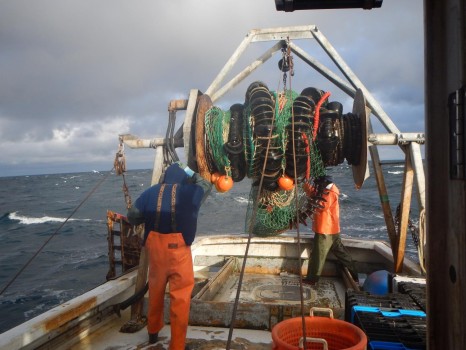 Pershing and colleagues from GMRI, the University of Maine, Stony Brook University, the Bigelow Laboratory for Ocean Sciences, and NOAA’s Earth System Research Laboratory, including the Cooperative Institute for Research in Environmental Sciences at the University of Colorado Boulder, found that increasing water temperatures reduce the number of new cod produced by spawning females. Their study also suggests that warming waters led to fewer young fish surviving to adulthood. Read the rest here 18:04
Pershing and colleagues from GMRI, the University of Maine, Stony Brook University, the Bigelow Laboratory for Ocean Sciences, and NOAA’s Earth System Research Laboratory, including the Cooperative Institute for Research in Environmental Sciences at the University of Colorado Boulder, found that increasing water temperatures reduce the number of new cod produced by spawning females. Their study also suggests that warming waters led to fewer young fish surviving to adulthood. Read the rest here 18:04
Industry-led sea urchin restoration project gets DMR boost
 An industry-led effort to determine whether sea urchins can be encouraged to grow in once fertile habitat got a boost last week. The Department of Marine Resources Advisory Council unanimously approved a regulation closing a part of the Sheepscot River to urchin fishing for nearly three years. According to DMR, the industry-led plan was developed through the Sea Urchin Zone Council. Commercial harvesters will do the majority of the work on the project with support from the department and scientists on the panel. Read the rest here 10:47
An industry-led effort to determine whether sea urchins can be encouraged to grow in once fertile habitat got a boost last week. The Department of Marine Resources Advisory Council unanimously approved a regulation closing a part of the Sheepscot River to urchin fishing for nearly three years. According to DMR, the industry-led plan was developed through the Sea Urchin Zone Council. Commercial harvesters will do the majority of the work on the project with support from the department and scientists on the panel. Read the rest here 10:47
Can cusk survive the ‘fish bends’? So far, we have determined that they can!
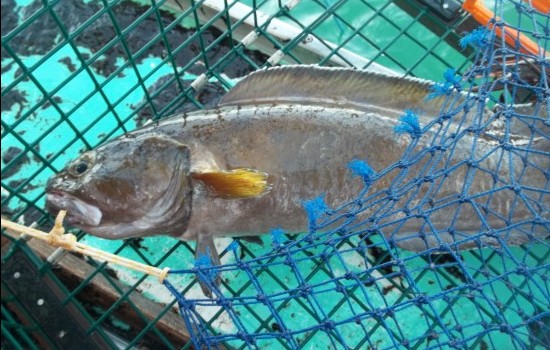 I have been working with commercial fishermen in the Maine lobster fishery to test if cusk can survive ‘the fish bend’s’So far, we have determined that cusk can survive if they are returned to the depth where they are captured. we have determined to test if cusk can survive ‘the fish bend’s’ despite all of the trauma they experience when brought to the surface. These lobstermen have been conducting experiments during normal fishing operations to collect data on the ability of cusk to survive. If a fisherman catches a cusk,,, Read the rest here 16:23
I have been working with commercial fishermen in the Maine lobster fishery to test if cusk can survive ‘the fish bend’s’So far, we have determined that cusk can survive if they are returned to the depth where they are captured. we have determined to test if cusk can survive ‘the fish bend’s’ despite all of the trauma they experience when brought to the surface. These lobstermen have been conducting experiments during normal fishing operations to collect data on the ability of cusk to survive. If a fisherman catches a cusk,,, Read the rest here 16:23
Study unveils why Atlantic bluefin tuna suffer despite prey abundance
 In a paper in the journal Marine Ecology Progress Series titled “The paradox of the pelagics: why bluefin tuna can go hungry in a sea of plenty,” the seven authors outlined how the overall condition (fat content) of Atlantic bluefin tuna in the Gulf of Maine declined despite an abundance of Atlantic herring — their preferred prey. The population of Atlantic herring has increased over the past two decades suggesting that foraging conditions should have been favorable for bluefin tuna. A decline in bluefin tuna condition despite,,, Read the rest here 10:26
In a paper in the journal Marine Ecology Progress Series titled “The paradox of the pelagics: why bluefin tuna can go hungry in a sea of plenty,” the seven authors outlined how the overall condition (fat content) of Atlantic bluefin tuna in the Gulf of Maine declined despite an abundance of Atlantic herring — their preferred prey. The population of Atlantic herring has increased over the past two decades suggesting that foraging conditions should have been favorable for bluefin tuna. A decline in bluefin tuna condition despite,,, Read the rest here 10:26
Climate change impact on lobster already visible, Lobsters struggle for breath in warming ocean
 Warmer water temperatures and more acidic conditions seem to make lobster larvae grow more slowly, preliminary studies have found. A researcher at the University of Maine is collaborating with a professor at the University of Prince Edward Island on what impact climate change could have on lobster. University of Maine Masters student Jessica Waller is trying to figure out why the larvae are growing more slowing, by testing them in the water conditions expected 85 years from now due to climate change. Read the rest here 10:26
Warmer water temperatures and more acidic conditions seem to make lobster larvae grow more slowly, preliminary studies have found. A researcher at the University of Maine is collaborating with a professor at the University of Prince Edward Island on what impact climate change could have on lobster. University of Maine Masters student Jessica Waller is trying to figure out why the larvae are growing more slowing, by testing them in the water conditions expected 85 years from now due to climate change. Read the rest here 10:26
Scientists, academics to lead groundfish study
A group of scientific and academic institutions is leading a researching initiative about the groundfish stocks in the Gulf of Maine and Georges Bank. The federal New England Fishery Management Council is giving $800,000 to the Northeast Consortium for the project. Read the rest here 08:11
FRIENDSHIP, Maine – proposed wind turbine farm off Monhegan Island was met with skepticism and outright opposition
![]() The presentation was made by representatives of the University of Maine to about 30 people at the Friendship town office. The wind farm would cover an 8-mile-by-8-mile area off Monhegan. “This would devastate fishing in that area if you do that,” said fisherman Kevin Benner. more@bdn 09:21
The presentation was made by representatives of the University of Maine to about 30 people at the Friendship town office. The wind farm would cover an 8-mile-by-8-mile area off Monhegan. “This would devastate fishing in that area if you do that,” said fisherman Kevin Benner. more@bdn 09:21
Top lobster scientists gather for Maine symposium ( wonder if they have any experts coming. Like lobstermen?)
PORTLAND, Maine — Top lobster scientists are meeting to look at fundamental changes that have affected lobsters in recent years after a summer that featured a potentially record-breaking haul in Maine and Canada and a crash in wholesale prices. The Maine Sea Grant program at the University of Maine is hosting a conference in Portland beginning Tuesday focusing on issues such as warming ocean temperatures, the changing food web and seafood economics. About 135 people have registered, including scientists from the United States, Canada and Europe, regulators and industry representatives. http://online.wsj.com/article/AP25a6a09cc2c242a597a0abbc9287bcb1.html

































